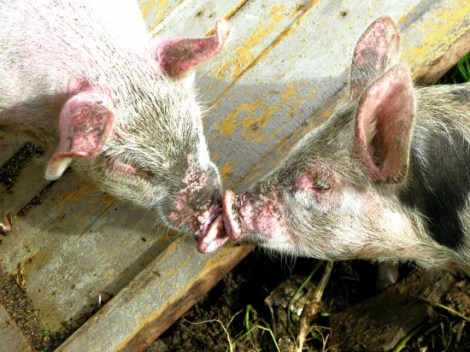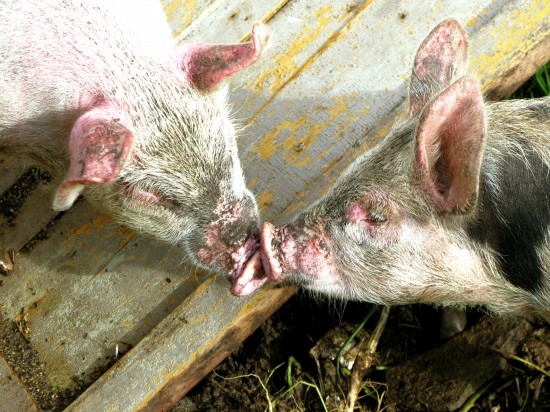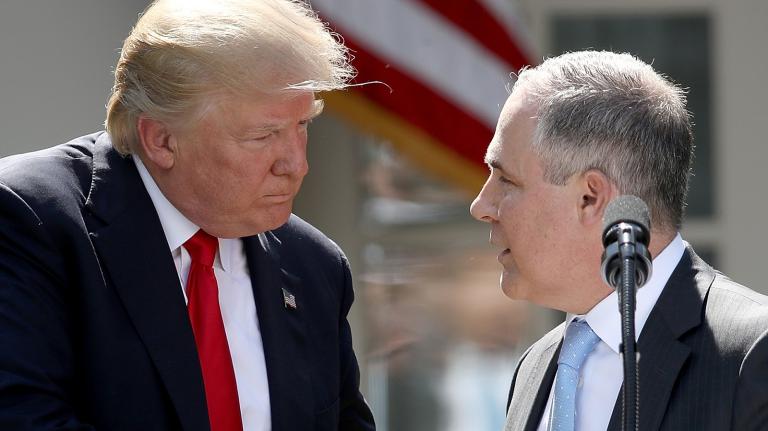
Far and away the thing that most motivates me to consider staying a vegetarian is that I hate the idea of animals suffering — not only as they die but also throughout their lives. But five weeks into this experiment as a meat lover testing out vegetarianism, I have to admit: I still want to eat meat.
I can’t do factory-raised, but I’m thinking, hey, farm-raised might be a nice compromise. I wanted to talk to some people who were involved in raising and killing their own animals, and lo and behold, I went to a party last week and happened to meet Josh Kilmer-Purcell and Brett Ridge, the stars of the reality show The Fabulous Beekman Boys, which tells the story of the couple starting a farm in upstate New York.
The show ended, the farm lives on. Kilmer-Purcell and Ridge raise two pigs a year, have them slaughtered on their farm every fall, and then they eat the pigs’ meat. I watched the episode in which their two pigs, Porky and Bess, are slaughtered, and interviewed Kilmer-Purcell about his experience raising, killing, and eating the pigs.
Q. So you had Porky and Bess from very young?
A. Yes, we got them when they were weaned and we raised them for 10 months before we had them slaughtered. That was the first time we raised and slaughtered two pigs, but we’ve done it twice more since then. We hire someone to come do it. [Laughs.] It is a misconception to think that every farmer can perform every task on a farm. I have slaughtered chickens before, but slaughtering a pig is a pretty special skill. It would be cheaper for us to bring them somewhere else to be slaughtered, but what’s most traumatic for the animal, we’re told, is the transport. We want to make sure we did everything as humanely as possible, and so we never took them out of their homes.
Q. I have to say that what has disturbed me a lot about raising animals for meat is not so much how they die but how they live. And your pigs seemed to live well.
A. Yes, I think it’s fair to say that they had about the best life you can imagine for a pig. They had a nice big pen and had very good food. We were very good to them.
Q. Tell me about the slaughter. How does it work, and how did you and Brett feel afterward?
A. Well, you wake up the morning of it and you definitely have this heavy feeling. And the first thing you do of course on a farm in the morning is go out and feed the pigs. And you’re feeding them thinking, “Wow, this is their last meal.” And the guys arrive to slaughter them. They sprinkle corn on the ground and the pigs come over to eat it, and they shoot them. This just stuns the pig. [In the episode the man slaughtering the pig explains that the shooting renders the animal senseless for bloodletting, which is the fastest way for it to die.] We watched the whole thing.
We were both really sad for a couple of days after the first time, and it has gotten easier, but it’s never easy. I’ve killed a chicken before, and killing poultry doesn’t affect me in the same way. Pigs are very hard. Their eyes are very human.
The first time, we actually asked the guy who does the slaughter if we should separate the pigs so the one didn’t get scared while the other one is being killed, but he said it was all right, the other pig would be OK. The sound of the gun being shot definitely scared the other pig, but after a few seconds it calmed down and just started eating corn again. The guy was explaining to us that yes, pigs are smart, but they don’t have a concept of what blood is or anything.
Q. In the past few weeks of not eating meat I have had to think hard about whether I can eat something that died simply for my pleasure. Surely you have thought about that?
A. Oh, yes. I’ve definitely thought about it. It is so clear to me that meat is worth so much more than we pay for it at the grocery store.
We choose not to be vegetarians. We enjoy eating meat, we enjoy preparing it. We have a responsibility to the animals we raise and I think that we fulfill that. But there are consequences to that choice for us, some bad feelings. Ultimately, I guess I feel like those consequences are not such that I am willing to be a vegetarian.
After talking to Josh I cheered up. I thought, wow, I could eat meat and be a nice person too!
But then I thought about what being this sort of meat eater might entail. It might work if I went to people’s houses for dinner and said, “I’m a vegetarian” and just ate the salad and the bread and so on. I don’t think people would hold that against me. (I never have.) But as far as going to someone’s house and saying, as the meal they prepared is set before me, “Is this factory raised? If so, I pass”? Maybe some people can do that, but I just can’t. If they thought of me as a meat eater, I would just eat it. Also, I am pretty sure if I ate meat, I would eat meat. I mean, I could say, “I’m only going to eat this kind of meat.” But when you’re hungry, or not wanting to offend, you will do just about anything.
So then I thought, well, I will tell everyone I am a vegetarian — and then eat meat on my own, in secret. But that just seemed like creepy, drug-addict behavior.
I am not terribly disturbed by the idea of eating meat that comes from animals that lived and died the way these pigs died. But at the same time, I know that part of not being disturbed is just that I really want to eat meat, I want the pleasure, and if I choose to eat meat, I am choosing my pleasure over everything else.
Because it’s becoming increasingly clear that, unless there is a health issue (and I don’t believe I have one), there is no reason to eat meat other than for pleasure. It takes a lot of space to raise meat; it uses up a lot of resources in general.
But am I really a serious enough person to forgo doing something that I like? Particularly when there is this industry of “boutique meat” — which I, not having a family to support, can afford to indulge in when I have a craving?
I was hoping that as this experiment drew to a close, I would no longer want to eat meat. And I did succeed in not wanting to eat factory-farmed meat. But if Josh Kilmer-Purcell walked in here with some of his farm-raised bacon right now, I would eat it. Well, not right now, because I’m bound to this experiment. But in a week or so? I would go for it.
Then I talked to a friend of mine who has been a vegetarian for a few years. He is also a very un-strident guy who doesn’t care what I eat or don’t eat. He doesn’t eat meat because he can’t deal with the guilt. “I feel like that stuff leaks into your emotions. I like not feeling guilty about animals dying. Of course I like meat. Meat is delicious. But that’s the only thing it’s got going for it.”
I’m thinking, with one week left, delicious is a lot to have going for you. But is it worth it?
There is no way around the fact that if you want to eat a mammal, someone is going to have to shoot it in the head and then stab it so it bleeds to death. I wouldn’t want that to happen to me, no matter how great my life was — but I feel like it’s OK to do it to a pig or a cow, because they’re not human. And so many people think that’s OK that, indeed, perhaps it is.
Still, I’m relieved that — at least for today, while I’m still bound by the terms of this experiment — I don’t have a choice about whether or not to eat meat. Because I don’t feel good about doing it, and yet I feel deprived thinking it’s a permanent sacrifice.




